June 2019 Wrapup!
The theme months are proving to be really challenging – so far the only month that’s felt easier for having a theme is April, where I got to voice basically whatever I wanted and gave myself license to be a bit mean or spiteful. This time around, Pride month has been a challenging time of finding things to talk about that weren’t The Same Thing over and over.
Blog Posts!
Still, there were some articles I was proud of; I liked my piece on the Stunticons, I liked musing about queer mechanics, and I spent a bunch of time considering just what I meant by ‘queer media,’ too. I liked my review of Billionaire Banshee, and so did its creator! My feelings are still up in the air about the huge post about Final Fantasy Crysal Favela Nibilis, but I’ll give it this: I had to do a lot of research to make it happen.
Video!
The video this month was a lot of fun to do. I didn’t want to make it so simply, but thanks to coordinating time and audio needs, here’s what we got: Fox and Talen talking about character design and the dateability of various Planeswalkers in War of the Spark based on their Japanese art!
Shirts
Shirts, well it was a big month for shirts. Without filling this post up with a bunch of pictures, I’m just going to link to the many different shirts I made this month. Something I did this month that I’m pretty proud of is a giveaway contest; I gave stickers and shirts away this month, for each of the shirt designs I released.
What effect did this have? I have no idea. Hopefully it’s good, but I don’t really know. I like these designs, and I kind of wish they were being bought more, but I also recognise that not many people have a lot of money to spend on Redbubble shirts.
Games?
Game work this month has been bored in with a laser-like focus on my PhD work. Sorry, folks. It’s been getting some partial inference – I’ve been playing this little Carthage game idea. There are also some more pieces on Hunter’s Dream going up in the next month, which are a bit more long-form and detailed about problems and solutions.
Personal Life!
In my personal life? This month has been really weirdly difficult. Not difficult because I’ve been experiencing pain or trauma, or anything in particular has been really impacting me? But I haven’t been getting sleep, and I haven’t been productive. My backlog this month has dipped down to as few as 24 articles ahead. There were numerous days when my PhD readings were all I could manage to do, and I don’t know why.
I think I might just be really sad in a weirdly generic way. I don’t know what to do about it.
One thing that I did this month was mark my students’ final dossiers, and you know what? Students are really good. I keep saying it, but it is still something that makes me smile. I’m lucky, my students are in a position where mostly they don’t have to try and fool me into thinking they did or get something they didn’t. We don’t do exams or quizzes the way that other subjects have to; the project they make is about demonstrating to me in a clearly communicated way what they did and what they’ve learned. Every time I do this, I find it so rare to find a student who was blowing it off. I even had one student who tried to blow it off, but they got caught up in their project, they focused on what it meant, and suddenly they’re producing this insightful study! It’s great!
Also, this month – and May – I did a flag thread that took most of my nights, and it wasn’t that fun to do. It was a lot of work and a lot of the content was very generic, so I felt like I wasn’t doing a good job.
I don’t have any smart or clever addition here? I’m just… really tired. And I want to be honest about it.
June Shirt IV: Arcadia Bay
For Pride month, I felt I could have a little Wrath.
I’ve said that Life Is Strange is ‘a really good fanfiction attached to a garbage-ass canon made by tools.‘
Here’s the design:

And here the design is on our friendly gormless supposedly unisex Redbubble model:

And here’s the design being modelled by the Teepublic ghost:

This design is available on a host of shirts and styles. This design won’t go well on stickers, because the faux-distress is part of it. I recommend if you get it, you make sure your colour choice is high-contrast with the yellow, so a green or a red.
Game Pile: War of The Spark!
Fabula Nova Crystallis
Once upon a time, this was a Game Pile about Final Fantasy XIII-2. Then it became an examination of Final Fantasy XIII, as the grounding work for XIII-2. And then, like an archaeologist probing at the edges of a shape, tenatively touching and nudging, I learned the secret. I learned that beneath the shape of Final Fantasy XIII and all the way through to Final Fantasy XV, there was something.
There was a brand.
I started this examination with the best of intentions, the absolute kindest of intentions, I really did. I just wanted to talk about a big JRPG, maybe play through it most of the way, talk about how modern JRPGs have changed, and compare them to my early experiences. It was gunna be fun. I had a few hundred words on menu-based combat and references to Final Fantasies 5 and 6, the ones I like the best. I was going to lead to this sort of ‘change is good’ conclusion that accepted that just because things weren’t the way they were in 1995 doesn’t mean they’re actually bad. I had a trajectory! I had an arc!
It was meant to be basic!
But as you can tell, thanks to the subject, I didn’t get there.
Instead, we’re going to talk about Final Fantasy XIII-2‘s underlying vision, and the Accidentally Lesbians.
Continue Reading →Background Gaydiation
Content Warning: This is an article mostly about extending trust to corporate media and that means I’m going to mention a crap transphobic joke from a movie that’s pretty well liked. There’ll also be mild spoilers for Deadpool, the movie, and Wynona Earp, the series.
Unserious Queeriness
My first draft for everything this month has been a series of articles that are mostly me yelling angrily about various fan theories about how queer series aren’t queer, or how easily you could queer a series and improve it (Blacklist), but one thing I’ve been avoiding doing too much is talking about work that you might think of as serious queer media.
I have a couple of reasons for this. One is that I tend to find this stuff really super alienating. I’ve been looking for options of Queer Media to cover that I think I can cover in a way that’s useful or meaningful. It has involved interrogating what I even talk about, or why.
Let’s really quickly mark out three types of Queer Media that I don’t want to talk about here: There’s the two spaces of Horny Queer Media which I hope is just pretty obvious, and what I’m going to shorthand as Painful Queer Media, which is where you get your tragic personal memoirs and personal accountings of abuse or transphobia or lesbiphobia or so on, or how hard it was to get your first gay experience, or that sort of thing. Singular, personal vignettes.
The third type, which I’ve talked about already, is Subtextual Queer Media, where the queerness isn’t there so much as it’s easy to see queerness if you know about it. You know, stuff where it’s Queer, and the Fanbase are very sure it’s Queer, but if you can watch it as someone who doesn’t know what queerness is, or who believes that same-sex people can just be friends, then it doesn’t make you ask questions.
Now, I feel ill-suited to talk about Horny media. I had an explanation, but… nah.
Just nah.
And when it comes to the Painful Queer media, I just don’t feel like I’m qualified or that I can offer a meaningful insight. What’s more, showcasing this kind of work feels like the wrong fit for me. Not that it’s not valuable or meaningful, or that I think you shouldn’t make it if it’s the kind of art you want to make.
The idea that Queer media is confined to this space where the art has to be tragic, has to be painful, or it has to be completely facile reminds me of Hannah Gadsby, in Nanette, talking about how for the people who aren’t beneficiaries of the privilege system of our world, to stand on a stage and lay bare your soul is not an act of humility, it is an act of humiliation. I don’t think that I have a meaningful lens to offer on that.
I want to write about adventure. I want to write about heroics. I don’t want to try and make some way to connect my damaged soul to the writings of say, an enby making a game about the challenges of American medical health care. I’m damaged in different ways, so I can’t really offer my meaningful lense to the matter, and I don’t want to hold up these traumatic experiences of other people as if I’m somehow good for showing you this thing you totally would never have checked out if I hadn’t shown it to you.
That’s not what I want to write about either! I don’t see the value. My damage and my situation aren’t, I feel, taken seriously in queer spaces, so it’s not like me saying ‘here’s how this intersects with my pain’ is meaningful to anyone. Tragic manpain, I’m sure. And if I can’t meaningfully contribute to the conversation, I don’t want to be seen as performatively looking at things that don’t speak to me. It was bad enough to deal with a month of romance games that made me feel gross, after all.
Nah, what I want to talk about is fighting and reasons. Characters and motivations, people who do stuff and why they do that stuff. Slow boiling coffeeshop AUs are for other people. Instead, I want to show you queer adventures and stories about fighting baddies and punching dragons and slaying or being cool monsters, but like actually being a cool monster and not a monster being a metaphor for atypical body types and therefore you just want to play videogames and sleep in. That means that I lose some space for complexity, which I guess I’m okay with, because what I lose is stuff I wouldn’t do a good or meaningful job dealing with. Let’s instead spend our time finding queer media that isn’t About Queerness but is instead about Doing Things where Queerness is an assumed standard. I can do fun and goofy and non-intense.
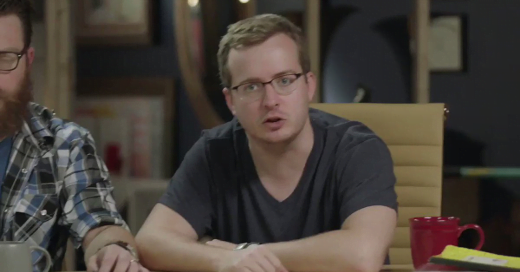
In the words of Griffin McElroy, This is a ding-dong podcast.
Story Pile: Ranma ½
Ranma ½ is a Japanese manga series in the ‘whacky martial artists doing whacky stuff’ genre starting in 1987 and concluding in 1996. It’s a big work – over those ten years of weekly releases it made almost 38 volumes of stories, which range between classical kung-fu duels, adventure stories, harem anime hijinks, school test drama, pg-rated sex romp and magical-realism short stories. It’s probably one of the most important anime of its time, with an influence that stretched well over two decades, and one of the queerest really straight things in the world.
And if you know me, you had to know that me talking about this series is more of a when than an if.
George Washington’s Gay Best Friend
Hey, you ever heard of this guy? Friedrich Wilhelm von Steuben?
You might have seen some stuff with his name on it, around the right area of America. Dude was considered pretty important, because of his contribution to the Revolutionary War. Part of it was his commanding particular units in this sortie or whatever, but the big thing he brought to bear was some ideas for the whole military to use. These ideas included ‘training’ and ‘a field manual’ and ‘being sure people knew what orders meant.’ In a lot of ways, Steuben was responsible for bringing George Washington the basic modern technology of military hierarchy and a command structure, and essentially founded the very template of the American Military.
He was also gay as hell.
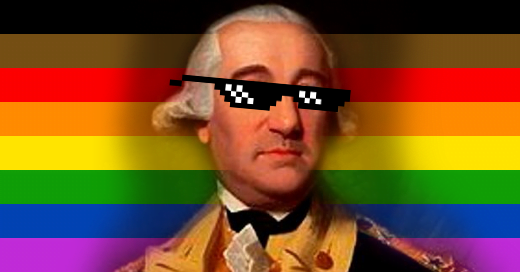
Steuben being gay is not a point of ambiguous historical interpretation, by the way. One of the things with looking into the history of the time is that often people who were gay or queer in some way or doing non-conventional gender things were all sort of put into a bucket of ‘well, maybe.’ Were these two historical dudes kissing? Was this woman who dressed and lived in men’s suits their whole life a trans man? What can we know for sure without knowing their inner lives?
Well, Steuben wrote about being gay and he made sure to not sugar-coat his sexual interest in men. His expulsion from the Prussian military was a little ambiguous, but it was clear it was definitely about a sexual relationship with another man. Either he was indiscrete about it, or the breakup went badly, or he cheated on someone, the possible reasons are ambiguous, but in his letters later in life, he was pretty clear that it was something of that nature.
Steuben was an interesting fellow; he also brought an elite guard with him from Prussia, who were all quite well-experienced soldiers from what was, at the time, the world’s elite military force. The other thing he brought to Valley Forge when he began the training was his sleigh, his italian greyhounds, and his ‘beautiful boyfriends.’ People were, in this valley, hungry enough to be eating their shoes, and Steuben rocks up on a sleigh, with dogs and boyfriends, flips off his fur coat and starts the I’ll Make A Man Out Of You bit from Mu Lan.
This is a small bit of history, and I am no fan of the US Military, but gosh it’s funny how a country that was paralysed only a few years ago about the conversation of ‘gays in the military’ forgot that it was founded in one of the gayest ways by one of the gayest generals, who was also one of their undeniable best.
Here’s to you, you massive prancing queer, and your boyfriends, too. Shame how it’s all shaken out.
June Shirt III: Everyone Plays
The last set of shirts was a bit of a heavy lift, wasn’t it? But it was also very much a trans shirt design for trans people, and I wanted to make a few shirt designs that were clearly trans-inclusive without necessarily being self-declarative. I mean, I’m not trans, but I’d still want to wear a shirt that makes my trans friends feel comforted in a gaming space if they see it.
Game Pile: Diary of a Spaceport Janitor
I picked up this game on the recommendation of my friend Caelyn, and the game’s own descriptor refers to it as an anti-adventure game. The game advertises itself with about as much story as you’re going to get: You play as the Janitor, an Alaensee girlbeast with a municipally-subsidized trash incineration job, who dreams of leaving Xabran’s Rock far behind her. In case you were wondering about whether or not she does, she does not, and the game instead focuses on the narrative of that being.
CISFORMERS: The Stunticons
You know what let’s trot out a silly personal fan theory based on a tiny window of time. In this TED talk, I will explain to you that the Generation 1 Transformers known as the ‘Stunticons’ are four trans girls dealing with an abusive father figure who wants to keep them closeted.
Content warning, I’m going to talk in a general way about how much Motormaster sucks and about some queer stereotypes, but everything is done in the name of fun and I’m not trying to get you to consider Something Very Serious.
Continue Reading →The Not Quites of Pride Month
This month’s writing was really hard and I say that because I’m not a full month ahead for once. Instead here I am, on the last day of May, rounding out the last of what goes into this month.
Part of the problem with a theme of Pride media is that I’m just not that into the same kind of stuff ‘Queer Media’ tends to be – which is usually elbowing our way into mainstream media that hates us, or scavenging for scraps in media that pities us. Oh, it’s not all bad, after all, there was a bisexual dude in a Marvel series last year, that was impressive, but for the most part, I’m just not that in into the things that queer media wants to talk about. I am outside of (hollow voice) The Discourse for the most part.
Oh, there are also some things that The Algorithm definitely wants to talk about. I could talk glowingly about a small number of Queer Darling Medias and for the most part I’d get to feel bad because hating these things is not a good look, because we don’t get interests, we get affiliations.
There were however a bunch of media I did consider writing about but discarded for a variety of reasons.
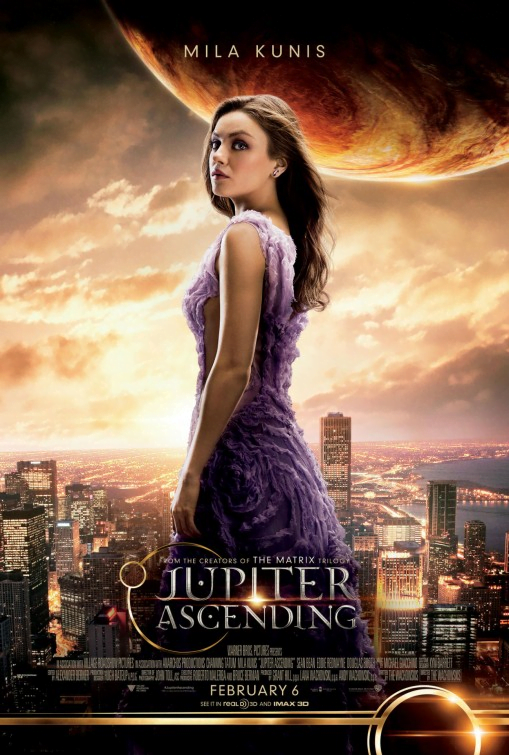
I considered writing about Jupiter Ascending, because it’s a great big movie, it’s fairly recent and it’s full of indulgent stuff that just smashes squarely into the ‘interests’ category of a lot of queer women I know. The problem is that it’s extremely straight and despite the fact it’s the product of a pair of queer women with a lot of very obvious textual framing for that, if I didn’t tell you a pair of trans women made it, you probably would never deduce it on its own.
That’s part of the problem with queer media’s current need for subtextual reference. Even when a pair of trans women get to make a movie with millions of dollars behind them, it still could come across as, well, pretty straight.
It is a great, lovely movie for pure self-indulgence, though. If you’re a girl who likes hunky boys and princess intrigue and ballgowns, and want a story that brings things to you on an extremely expensive, stylish conveyer belt, boy does Jupiter Ascending provide.
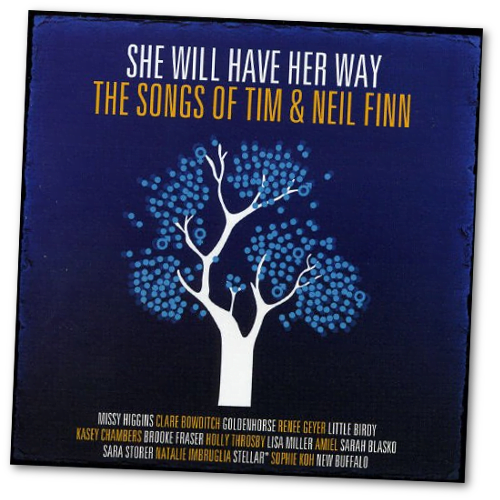
I also thought about doing a rundown of the album She Will Have Her Way, which is an album entirely of songs by Crowded House, covered by women vocalists. These songs are all transformed to some extent by the change of voice; in some cases, the words are changed, but in almost all they’re not, meaning this set of songs about women’s behaviour in relationships and the ways of their emotional complexity become about the self, about struggles with one’s own masculinity, and sometimes about being in love with a woman as someone read as a woman.
It basically becomes queer as heck.
The problem with this is that I, an unpatriotic monster, don’t actually like Crowded House’s songs. I just don’t! So while this is a good album (I mean, Fox loves it) and it does something I like (regendering voice in conventional pop songs), and I bet you’d like it, random friend reading this, I just don’t like it at all.
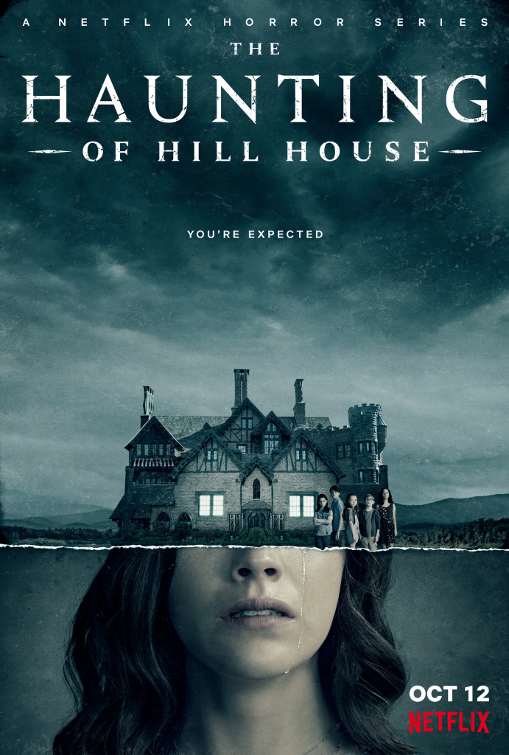
The final ‘maybe I’d talk about this’ was Haunting of Hill House. This is a really good series on Netflix, and it was referred to me by a very cool enby. At first I thought this was perfect for the month, because it has a major character who’s gay, and whose relationships are complex and woven through the story.
I stepped back from this at first, though because Haunting is a horror series and it’s a really good one, which means it’s incredibly creepy and filled with scary, horrifying stuff.
Besides, October is coming. Maybe I’ll write about Haunting of Hill House then, when we’re all good and ready for some serious spooks.
Gender Distribution In OCs
Did you know that you’re bad at estimating odds? It’s true!
One way you’re bad at estimating odds is that you overestimate uncommon values. I could do fun kinds of goofy tricks with examples like words or dogs on leashes and break out the Dan Gilbert playbook, but for now, trust me when I tell you that your brain is very bad at reasonably estimating odds. That means things like a chance for things to happen or a distribution of things. That’s why there’s an actual puzzle to things like ‘guess how many beans are in the jar.’
Anyway, we’re not here to talk about cognitive biases and functional memory, we’re here to talk about my OCs.
I roleplay a lot! It’s one of my favourite things to do. I have a lot of yearning for story spaces and I love my friends but I and my friends can’t just interrupt our days to go punch a dragon, so instead, we roleplay and we play in our own little fictional worlds with their own rules. I have a huge pile of characters over the years, and since I have so many, I do what any sensible nerd would do and put them in a spreadsheet.
After all, spreadsheets are cool. 😎

With the shutdown of City of Heroes (and that’s a complicated story now), I took a look at this spreadsheet and did a big crunch, realising that one column in my piles of data I had was pretty consistent. I mostly just made males. I had some nongendered characters, who were robots, and they were mostly referred to as males. At the shutdown of City of Heroes back in 2012, I had a cast of characters that numbered over a hundred characters, and that list was 95% male.
I thought about this but it wans’t until a few years later that I considered this spreadsheet and how I wanted to change that stat. I make characters to play in spaces, and I want those spaces to have cool characters in them, and I want there to be cool women characters in those spaces, and so… why not make more women? Why not write women, especially in the low-key low-impact way of roleplay spaces where I’m primarily playing pretend with friends and not creating a greater coherent text that is going to get reviewed by editors. That ensued a period of revamping some characters that were unused as girls, and making more women characters. In some cases, I even rolled a dice to just check ‘hey, is this character cis?’ because it was a question I’d literally never considered when I’d made them.
Then I thought, after two years of this that maybe I’d gone too far. Maybe my population of characters was massively female dominated and now was just an insight into the Horny of my mind, and I was seized with a pre-emptive embarassment. To the spreadsheet I went, to fill in fields and give myself that balm that is data.
Turns out that this fear that I was wiping out my male character population had resulted in a whopping 33% of the characters now being women. I thought I’d gone too far and I hadn’t even gone half way.
One example from a study of women in meetings shows how we handle stats badly. Dudes polled will often believe women have overwhelmed a group when they represent 33% of it; they will believe women talk 20% more than men when they spoke 20% less. And as with me, I thought I’d gone overboard when I hadn’t even finished addressing my massive bias.
We are bad at recognising stats. We are bad at estimating odds. We are ferociously bad at recognising our own biases. It’s worth checking yourself, and considering just what you’re doing.
Story Pile: Wynona Earp
Alright look this is a show about the great-granddaughter of Wyatt Earp with a magic gun that lets her kill super-outlaw undead cowboys in a town that’s literally cursed. It’s awesome. Let’s go.
The Skin You’re Virtually In
It’s been a weird few months, and there’s been a big issue I hadn’t spared time to talk about because I didn’t know much about what was really going on and didn’t know what would change. I write in advance, so for all I know, what’s stable is going to be overthrown by the time the article goes up.
City of Heroes is back.
Kind of.
Maybe.
Maybe not.
Maybe for good.
It’s on my mind, though, and one thing that’s on my mind is watching friends get back into it, and build their characters, but to build their characters now as the people they are now, and that means for some of these players, it involves confronting a big change in their life.
For some people, we’re talking about a big shift.
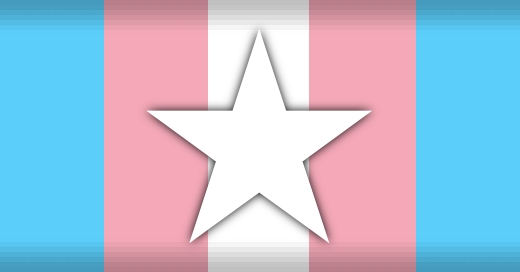
See, a lot of the guys I used to play City of Heroes with aren’t guys any more (or never were, really, depending on how they want to talk about their gender). And for a lot of people, the character builder in that game, where you could tailor details about your character, where you could make your girl, and you were expected to make something that was yours was subversive and freeing.
We know that people use performative spaces to perform. We also know that a part of what people do when given anonmity and performance is to play with identity; to play with expressing who they are and what they are.
I talk at times, to students and to friends, about why games matter. One example I give is that games let us practice feelings we’re not ready to deal with yet. We practice grief in losing and we practice joy in winning. We practice being kind and we practice being decisive. Games are the place we make a section of the world where we can deal with enormous, dangerous, powerful ideas that we can be told don’t have a place in our life, that are not to be played with.
Sometimes, games can let you be a cute girl with superpowers.
And you realise that that’s what you wanted, with or without the superpowers.
Games don’t need me to fight for them, not really. Games are well established, they’re financially successful, they have a history of cultural writing and academic consideration centuries long. Some elements of games – the transitory and the seemingly low topics, and yes, the raunchy and the exploratory and the embarassing, the things that maybe make us cringe a little when we say them, like I discovered my queerness by making out with a snake girl in Pocket D?
Those are things I want to fight for, and I want to fight for them because my friends matter and what makes them happy is important.
June Shirt II: Magic: The Gathering Colour Emblems
One of my most popular blog posts is the post, No Magic Colour Is Transphobic, which combines Magic: the Gathering colours and factions with ways those groups can handle and respond positively to trans themes.
A few years ago, someone asked an important flavour developer for the game if there was a bias towards transphobia or trans acceptance in one colour or the other, and the weird thing is I don’t remember the actual answer to that, but it got me thinking about how it’s possible in every permutation or group to make a reasonable, in-character response to the question of gender identity that doesn’t make one colour ‘have’ to be ‘the transphobia colour.’
People have asked me to put those designs on shirts, and I’ve been working on that for a bit over a year. It’s trickier than it looks, and with five colours that can be combined five ways, and designs that can appear on light or dark colours, it means that any given idea for a single colour has fifty permutations which I then have to do across at least two sites, for a hundred uploads.
That’s no fun!
Game Pile: Momodora: Reverie Under The Moonlight
Here’s a game that kinda wound up being nothing I wanted.
The Flash: Hetero Habits
I’ve watched a lot of The Flash lately. It’s a cool series, I like it. Amongst its problems though, because everything has problems, there’s this weird way the story accidentally serves as a crystallised minefield of The Heteros.
I don’t just mean ‘oh it’s so straight‘ because it is, I’ve seen three seasons now and none of the major, recurring, important characters are gay or even vaguely hinting at it. This is especially jarring when you remember this series shares space with Supergirl’s sister Alex Danvers and Legends of Tomorrow’s immensely powerful White Canary. These series exist in a world with The Gay, but The Flash basically runs into walls when it starts dealing with relationships, and it’s coincidence that those relationships are a festival of extremely bad tropes that all coincidentally relate to kinda bad ways to view women.
There’s the relationship between Cisco and G_psy, and, you know what, every thing about that character makes me uncomfortable so we’re just going to skirt around this and just say that every single thing the writers do with her makes me wish I had a god to whom I could pray for their souls. There’s a few other relationships – the on-and-off of Wally and Jessie, which has at least the detail that they’re young.
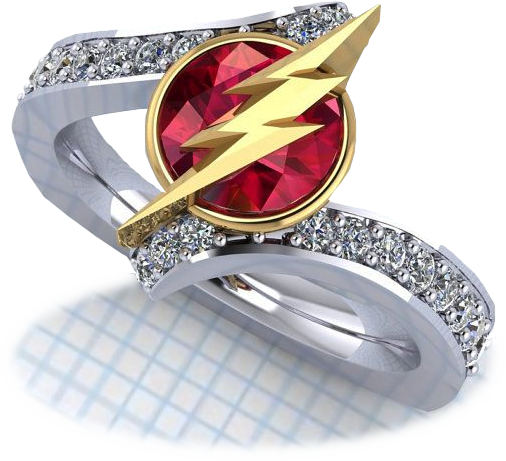
The real tricky thing for me is the way Barry and Iris interact. The big tension of Season 3 is Barry getting a vision that Iris is going to die, then solving that. Part of how they solve it involves a lot of commitment and speeches and it involves Barry and Iris advancing their relationship. That advancement, however, results in them talking about that relationship, talking about their feelings, talking about how they view their relationship. What follows then is a really strange, weird way they talk about their relationship as being permanent, as being destined and enduring.
That is weird and messed up when you’re talking about characters who have been friends since they were ten, and one of them was engaged to someone else.
I think about this a lot, particularly in the framework of the relationships that are designed to fit a mould, and it’s telling the way that the series’ lack of diversity plays into the kinds of relationships it shows. It’s not like they can’t do interesting or fun characters – but every time a woman winds up in a romantic relationship, that relationship is a very classically heterosexual, very classically patriarchal design.
It’s not like it’s an inherent problem of hetero writing. It’s just that when you write to easy and simple things, when you write to the simple archetypes, there are a handful of extremely basic ideas that just sit there. And when you use them, they stand out, big and obvious, and make it clear that you weren’t thinking about relationships, not thinking about romances, you were thinking about narrative chunks that have to bump into each other.
I’m not saying queer media can’t objectify women or reduce women to objects, indeed, it’s a whole different problem. But for all that I like The Flash, it’s still a story where for all that it does good, fundamental narrative fun with cool characters who engage me, when those characters try to engage with one another on a whole axis of human experience, the writers turn to three basic plots that were bad when I was a kid and show they haven’t thought about them at all.
MGP: Making Queer Games With Queer Mechanics
Starting January 2016, I made a game or more a month for the whole year. I continued this until 2018, creating a corpus of 39 card or board games, including Looking For Group, Senpai Notice Me, and Dog Bear. Starting in 2019, I wanted to write about this experience, and advice I gained from doing it for you. Articles about the MGP are about that experience, the Monthly Game Project.
I looked for some board games to talk about this month. One thing I was told a few times was there were games around, but they didn’t have ‘queer mechanics.’ This put me in bit of a quandrary, because I have no idea what that could mean.
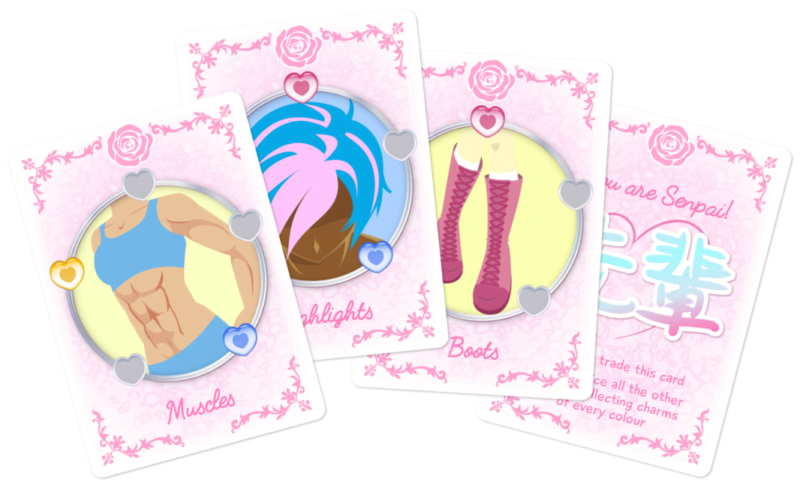
One of our most popular games, Senpai Notice Me! is a small card game with art, editing, and design by Fox Lee, and colouring and design by me, Talen Lee. This card game was originally conceived for YuriJam2016, where the aim was to make a game that was about the relationships between women. It didn’t have to be erotic, it didn’t have to be romantic, it just wanted to be primarily about the relationships of women to women.
When thinking about queerness in tabletop games, there are a few problems with what that queerness means and how it can be represented. In games like Eldritch Horror, there are gay characters, but players don’t necessarily ever do anything mechanically that relates to that gayness. In Fog of Love, despite being entirely about relationships, there’s no inherent need for gender to come up with the way the game plays, meaning the game is about as queer as the players think to make it.
In Senpai Notice Me! the fundamental frame is a queer relationship, and the main play experience is about becoming the person Senpai notices, or being the kind of Senpai who can notice everyone. It’s also, regularly, played by boys who are not necessarily queer in any way, building cute outfits that show off the personal style of a character mostly represented to them by a random assortment of cards.
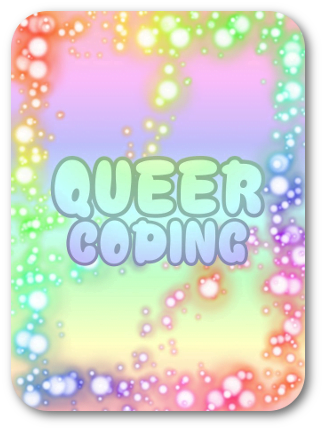
I also made, for GaymerXAus, the super-obviously queer game Queer Coding, which was a communication and con game. This game was not made to be super complex or intricate; I wanted to make a game that screamed queerness as loud as I could. It was a tiny project, too, made quickly and with only art assets I was able to make myself.
While both of these games are absolutely trying to be queer games, if you take away the themes and graphics chosen for them… they’re not. They’re just mechanics. There is nothing fundamentally more mechanically meaningful about arranging the letters of the word ‘queer’ than there is any other word with a repeated letter. Senpai Notice Me! could be about collecting weapons to slay a dragon, or just assembling the best gun collection to impress the real veteran, or an anime collection, or all sorts of things.
I think about this any time someone talks about a game ‘not having queer mechanics.’ That’s always kinda weird to me, because what does that even mean? My mechanics aren’t queer, but the games I make are games that reflect me, so it seems they’d likely have some queerness in them. What about Lesbian Chess, where the two queens can’t take one another because they’re dating?
In the end, I tend to give up on this conversation because there isn’t really a way to do ‘queer mechanics’ as much as there is a way to generate queer or unqueer fictions with your games.
Also, and this is a tiny but somewhat sour point: Playing games with queer fictions don’t magically make someone who is a jerk about queer people into a nice person. We can’t transform people with singular queer works. Maybe for some people, the media we create can be a catalyst, but you’re asking to make lightning in a bottle, there. It’s instead better, safer, and nicer, to make sure you create fictions where queer people (and all forms of marginalised people, but hey, one thing at a time in this post) don’t have to feel like they’re an afterthought.
Excerpt: The Nyarr
This is an excerpt from the Nyarr, a race expansion I’m making based on my 3.5 D&D work. This is an abridged excerpt of some details about the Nyarr – their general physical look, their interaction with that thing called ‘gender,’ and some writing about what it’s like to be a Nyarr.
The Nyarr are meant to be a culture you can jam into a game that players can easily pick up if they want to play someone without the same Genders Stuff as a conventional setting’s conventional cultures have. In the same way that people sometimes are drawn to things like the Girdle of Gender Change, the Nyarr are a nonbinary race of cool-looking nice monster people.
Story Pile: Love Live
Up front: I’m not going to talk about Love Live or its actual stories. Sorry. I tried. I really did. But I kept getting caught up on what I can’t help but think of as Love Live’s Boypocalypse.
This one’s not going to be a happy chat about lesbians.
Continue Reading →Sheith!
Y’know, I’m not actually big on shipping Sheith.
This isn’t because it’s a bad ship or nothing. It’s —
You know what, let’s be really quick here for the normals that might wind up reading this. Shipping, which started with the Starsky and Hutch fandom in the 1970s, is the idea of members of a fandom pairing two characters together in a (usually sexual) relationship. This usually, but not always, serves as the basis for some kind of creative media outside the series or book or story that explore or express that.
So you know, if you watch say, Power Rangers and hope that the pink ranger winds up with the blue ranger instead of with the green ranger (and ho boy do I have some news for you on that front) you are, in that time, ‘shipping’ those characters in your mind. If you want to talk about that pairing, you’d refer to that pairing as a ship; ‘the pink ranger/blue ranger ship.’
This is pretty normal and you’ll find lots of people do this even if they don’t necessarily think of it as an activity with a name. You could look at the long-term predictions about relationships people made about Game of Thrones as a sort of massive mainstream shipping incident.
Continue Reading →June Shirt I: Pride Shields
Hey, who likes Superheroes? And flags?
Well do I have a post for you!

Game Pile: Billionaire Banshee
Videogames do a lot of work automatically, which means that there’s a lot of ways that two very similar games can be meaningfully different, and so exploring them is challenging. What’s more, communicating that difference can be challenging, too; I could tell you that Titanfall 2 and Dishonored 2 are both followups to successful games with alternative movement schemes and a buddy that becomes part of your mission flow, with a setpiece level including alternate timelines, but if you know videogames, you know those points of similarity are way less obvious than the points of difference. After all, in one of those games, you’re running around with a gigantic mecha and the other is a steampunk stealth game.
This is because there are layers of systems and hardware that sit between you, the player, and the game you’re playing, layers that are not only not under your control but are very specifically developed and defined by someone who isn’t in the room with you. This means that videogames get to be very complex in a way tabletop games aren’t when it comes to the immutable, consistant set rules of the game. Tabletop games get to be way more sophisticated on all the levels of players playing them, though, because the rules are dynamic, and under the control of the players all agreeing to play the game the right way, together.
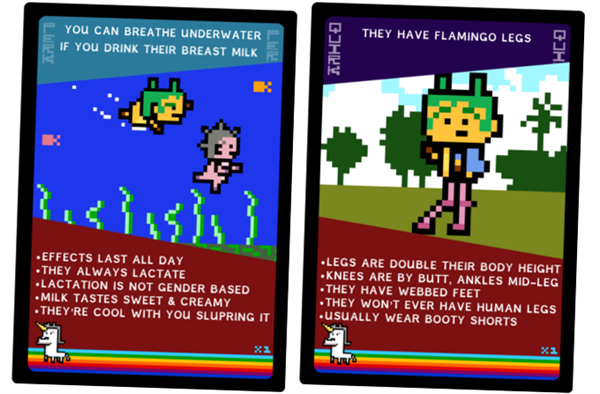
I Like: Benjamin Wheeler
I have a really sour love of Canadian Highlander. It’s a really interesting format whose first impressions in the online space were presented in a way that I felt was really dickish and condescending. Yet, thanks to the neverending presence of a bunch of very entertaining professional comedians playing the game, I’ve come to really enjoy the format (though not enough to investigate playing it myself).
One thing that’s made me really appreciate the game is one of the North 100 podcast’s hosts, or rather, the newest host, Benjamin Wheeler.
Canadian Highlander is a format where duals and fetches run rampant and that makes it economically unfeasible. Ben has talked about budget in the paper format, but also shows ways to make it accessible on MTGO. It’s cheaper, and also, because we get a one-sided take on very thoughtful engagement with the game, Ben digs deep into complex combo lines.
I like these streams; they’re long, Ben’s taste in music amuses me, and occasionally you get Keifer Content, where his husband like, vapes the screen full of fog. It’s fun, it’s funny, and technically, queer MTG Media, so hey, it counts this month.
Making Settings Queer
You think because I’m doing Pride Month I’m going to shut up about Dungeons & Dragons and my own setting? Of course not. Let’s talk about putting queerness in a setting, some ways to do it and some ways I don’t want to do it.
Specifically, one thing I don’t want to do in my setting is make queerness something’s property. I’ve talked about how sometimes players make Tieflings into queer metaphors and why I don’t like that, but understand in this case I’m not talking about this as a player. If your tieflings or orcs are The Gays to you, then you go on with your bad self, I ain’t here to tell you nothing. But as a world builder, as someone constructing this setting that will be handed to maybe people who are one of the less cool types of queer, or maybe even not very queer.
Is Blacklist Queer?
I have a love-hate relationship with Blacklist, the NBC tv series that basically exists because James Spader is a charismatic man who looks good in a variety of neat hats. It isn’t a good series. Not really. I don’t think you’ll lose anything by being spoilered on plot points from late in the series, but I also don’t think you should be sinking hours and hours of your life into watching this show to keep up with what I’m talking about.
Still, it briefly opened the window for a queer angle that would have been amazing and exciting and then it didn’t do it, which feels like an enormous own goal. But I need you to understand what I’m talking about, so let’s put that in your hand, and you can meet me after the cut, if you want to.
Spoiler warning for the general plot and some specific details about Raymond Reddington’s identity in The Blacklist, and also some cissexism and transphobia from a show I don’t think that much of.
Continue Reading →Story Pile: Atomic Blonde
At its core, Atomic Blonde is an excitingly familiar type of movie. It’s one of those Sunset Noir stories I like, with contrast-driven high-society low-life all outlined in the bright nimbus of neon colours. Where much of Sunset Noir works around the tension between the extreme wealth owned by powerful criminals, existing in spaces without what we think of as a normal safety net, a society that doesn’t have the protections of society, Atomic Blonde uses that contrast to show us a spy thriller, set in Berlin, 1989, a week before the collapse of the Berlin Wall.
Defining Queer Media
Okay, I’m going to spend June trying to talk about Queer Media, but then, what does that mean?
Like, actually?
June is… Pride Month!
The month of the sin I’m probably the worst at, it’s Pride Month!
I don’t know how clear it is when this blog posts go up and are removed from context, but I don’t feel like I make a big deal of whatever queerness I have. I mean hell, I just referred to it as ‘whatever queerness I have.’ Like, I’m really reluctant, even with the way ‘gay pride’ has been so uselessly broadened, to think I belong in ‘the gay community’ or refer to myself as any kind of ‘gay.’
Still, I am a bisexual dude, and while I talk about media from queer perspectives time to time, I am not just giving information based on reading and listening, but also from my own experience.
This month I am going to write about Queer Media, I’m going to try and foreground some Queer Games, going to make some more Pride-related shirts, and maybe talk some about queer takes on non-queer media, and what ‘Queer Media’ even means. I’ll try to keep a lid on this, try not to get too overtly and ridiculously salty.
Once again, I promise I will not talk about Undertale, Steven Universe or She-Ra. I dunno, maybe if someone wants those takes, they’ll pay for them.